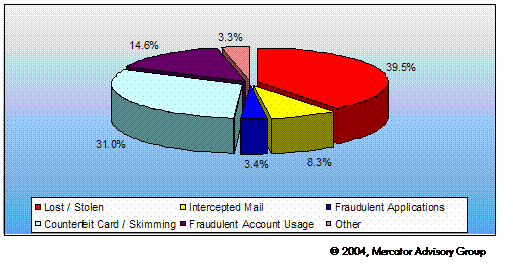Overview
Boston, MA
March 2004
E-Payment Security and Online Fraud Prevention: Self Defense for Merchants and Cardholders
NEW RESEARCH REPORT BY MERCATOR ADVISORY GROUP
The fear of online card fraud has been the topic of much press coverage recently, with the horrors of identity theft and phishing attacks leaving the public in a state of anxiety. This heightened fear can have a seriously detrimental effect on e-commerce. Cardholders need reassurance that merchants aren't unscrupulous criminals, merchants need to know that the cardholders are legitimate and both parties need to know that the transaction cannot be intercepted.
The latest report by Mercator Advisory Group, titled, "E-Payment Security and Online Fraud Prevention: Self Defense for the Merchants and Cardholders", takes an in-depth look at the world of online card payments, the fraud loopholes that are open to criminals and the methods and systms that have been developed to prevent attacks from happening.
Nick Holland, Director of Emerging Technologies Research at Mercator Advisory Group and the author of the report sees a problem of fraud as an arms race between the criminals and the stakeholders in online card payments:
"As with the physical world, the key to fraud control is making the activity of fraud unfeasibly expensive for the fraudsters and still affordable for the stakeholders. The gap between the two is a fine one..."
Credit Card Financial Losses by Type

The report details a range of different initiatives including VbV (and SecureCode), single use card numbers, password generating tokens and others designed to secure the cardholder/merchant interaction and offers metrics addressing the question: just how bad is online fraud?
Holland sees a major component of the skepticism relating to online transactions to be a result of the fear of the unknown:
"Whatever fear there is of online card theft, the overwhelming opinion among cardholders seems to be 'it's not going to happen to me', But, there are clearly concerns that it might. The $50 liabillity cap offered on most credit cards provides financial protection from fraud, but it is well known that an incident of identity theft results in not just financial losses, but substantial time and effort to undo the damage to a consumer's credit status. Moreover, the enduring image of the Internet as a gaping black hole still exists. At least in a real world incident of card theft or loss, you have some idea of where and when you lost the card, some feeling of control. The Internet removes time and place and that scares people..."
The report contains 35 pages 20 exhibits.
Members of Mercator Advisory Group have access to these reports as well as the upcoming research for the year ahead, presentations, analyst access and other membership benefits. Please visit us online at www.mercatoradvisorygroup.com.
For more information call Mercator Advisory Group's main line: 508-845-5400 or send email to [email protected].
Learn More About This Report & Javelin
Related content
Capital One and Discover: A Big Deal, Not a Cakewalk
The newly approved Capital One-Discover merger, which comes with a combined $250 billion loan book, creates a behemoth in payments but will require firm and judicious leadership to...
Riffing on Tariffs: Now is the Time to Build Your Small Business Card Portfolio
Small businesses represent the backbone of the U.S. economy, but they also struggle with the cash flow necessary for long-term survival. Amid the U.S. imposition of tariffs, many s...
Seven Credit Card Warning Signs in 2025: Don’t Stop Lending, but Watch Out
For credit card managers, assessing risk metrics and adjusting their strategies are the bedrock aspects of the job. Right now, those messages are mixed. Unemployment is steady, inf...
Make informed decisions in a digital financial world